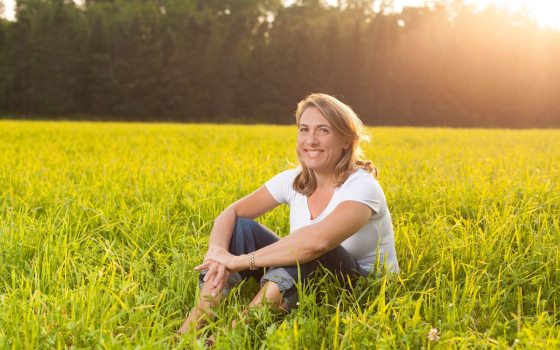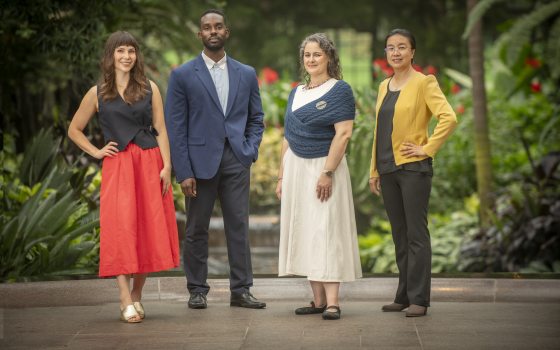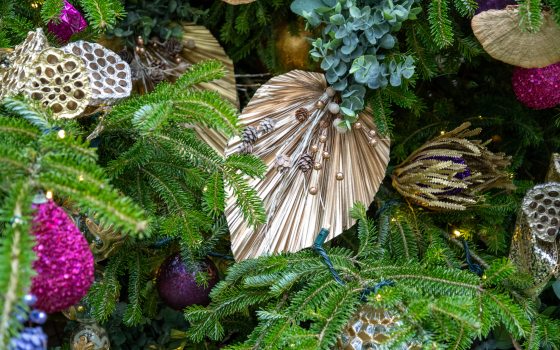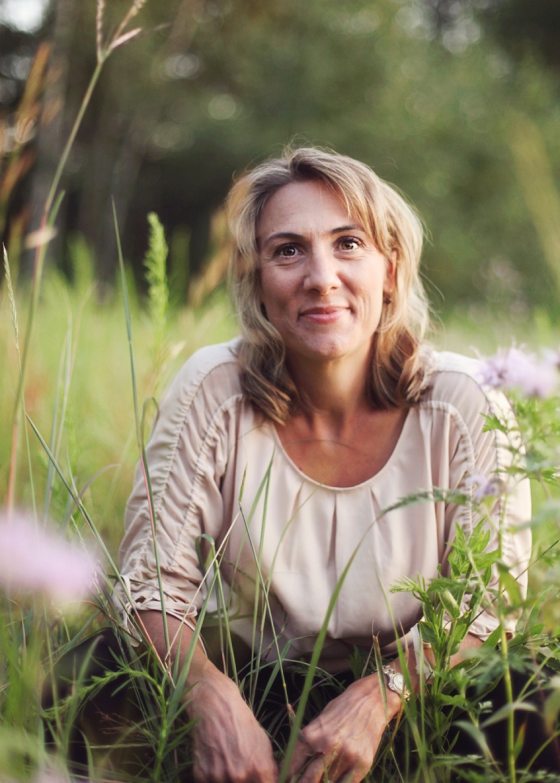
Photo courtesy of Hope Jahren.
“What comes first is a question.” That assertion is just as true for a rousing Community Read dialogue as it is for any problem to be solved. It also holds true for bestselling author Hope Jahren’s life as a scientist, and it is the invitation she offers us at the outset of her memoir, Lab Girl. Asking questions—one after another—is what it means to be a scientist. Jahren invites us, as readers, to ask questions about the world around us so we, too, can become scientists.
We are proud to welcome Hope Jahren to Longwood Gardens on March 24, 2018, for Celebrating Women in Science and Horticulture, and for A Community Conversation. Recently we had the opportunity to ask the author some questions about her life as a scientist, and about writing her national bestseller, Lab Girl.
With your opening sentence, “There is nothing in the world more perfect than a slide rule,” you transform an old and basic tool of science into a vivid memory—an invitation into your childhood and into your life as a scientist. The tools and materials of science figure heavily in your book. What do they symbolize? Why do they matter?
Every gardener has her favorite trowel! I think that when you love your work, you associate the objects that come into play during that work with happiness, such that it feels good to simply look at the objects, to be near them. I feel that way about my dad’s old slide rule, and the red pencils that he used to use for grading, and the glint of stainless steel—as well as with the smell of classroom chalk and plugged-in electronics and the glow of fluorescent lights. Wherever you feel safe, loved and happy—the environment around you and the objects adjacent to you will come to serve as triggers for those emotions as well.
You describe gardening with your mother, and your memory of the sound of your garden growing. How much did your early gardening experiences influence your choice to study soil and plants?
I can’t say that I fully understand the reason for it, but I’ve found that almost anything that gets people outside is an experience that enriches their lives. I’ve seen with my own two eyes how knowing a little bit about the world—the names of a few different trees, for example—can raise self-confidence almost instantaneously. There’s something about us that wants to recognize the natural world as a familiar place that we are capable of understanding. Gardens and arboretums are perfect environments in which to encourage this learning, and to share the valuable things that help people feel like they are part of the world. What’s more important than that?
Do you think that a knack for scientific inquiry can be taught, or is it something more elusive—an inborn quality that must be nurtured?
Many adult scientists remember forming a fascination with their field of inquiry very early in life, during or even before grade school—running around looking at bugs, trees, lizards, trains, puzzles, dinosaurs, rocks, whatever, and just loving it. I often tell parents to look out for this behavior, and to indulge it. Plan your whole vacation around it, check out every book in the library, go ahead and totally go overboard chasing that interest as a family. It might be just a phase of curiosity or it might be your kid’s life-calling—either way, giving your young child the strong message that curiosity and learning deserve all the passion you can summon, and that you support them 100% in their learning, is a message that will serve them well throughout their lives.
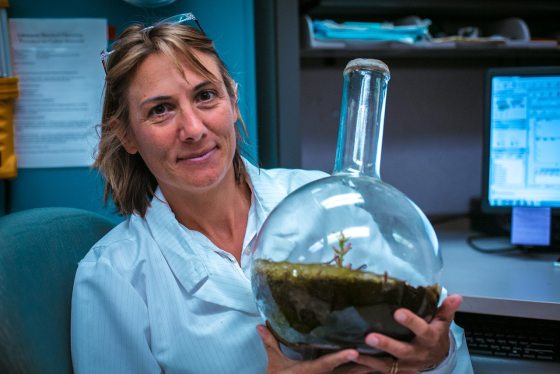
Photo courtesy of Hope Jahren.
How did the idea of writing Lab Girl come to you? Does the final book differ in any way from your original visions for this project?
For many years I thought about writing a textbook, but when I sat down to explain what twenty years of research had taught me, I couldn’t separate the story of how we did the work from the story of what we learned, and how we did the work includes a lot of things, like the people who were important and the personal cost of committing ourselves to the work. There was a while where it wasn’t clear whether it was a textbook, or a memoir, or a buddy-story, or a bunch of essays, or what. In the end, I stopped worrying about what it was and just wrote it out, and Lab Girl is what it turned out to be.
Is there a story behind the title of the book?
The book is called Lab Girl because my very first memories, as a very little girl, were of being in my father’s lab. Before I knew what it was to even have a job, I knew that when I grew up, I wanted to have a lab—a big one with lots of stuff in it where I could play with my best friend. I only realized how unusual that was a few years ago, when people started to ask me when it was that I decided to go into science and I couldn’t answer them—wanting to have a lab so that I could never leave the lab is the only thing that I ever really knew for sure all my life. I never imagined not being a scientist. Regardless of where life takes me, my real joy is in having kept that feeling that I had as a little girl—that feeling of happiness and safety while working, of wanting to be in the lab. I still prefer it over every other place on Earth.
What’s next? For you? For your writing?
I am writing about Global Change … writing Lab Girl was partially about me trying to understand my own life; before I wrote it I had done a lot of things, lived a lot of different places, knew some unusual people, but it didn’t make a lot of sense. After I sat down and wrote out Lab Girl—really thought about what had happened and what it meant and why parts of it were important to me—all of a sudden my life was a story with a beginning, a middle and, well, I guess an ending. Now I want to understand not my life, but my time. What is it about these fifty years, 1969 to 2019, that is important and unlike other times? I am trying to make sense of it in a new book, and it’s really a wonderful way to spend time, I sit in the middle of the lab and write, surrounded by data print-outs, and I love it.
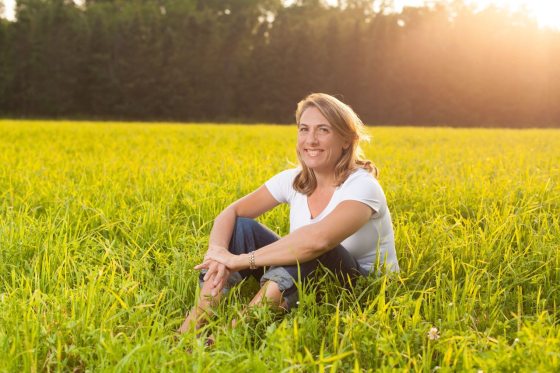
Photo courtesy of Hope Jahren.
Now Longwood Gardens invites you to start reading Lab Girl by Hope Jahren, as well as our other 2018 Community Read selections: Women in Science by Rachel Ignotofsky, and The Tree Lady by H. Joseph Hopkins. Be sure to check out our complete list of Community Read events sponsored by our community partners … look at the world around you in a new way … and ask a question!
